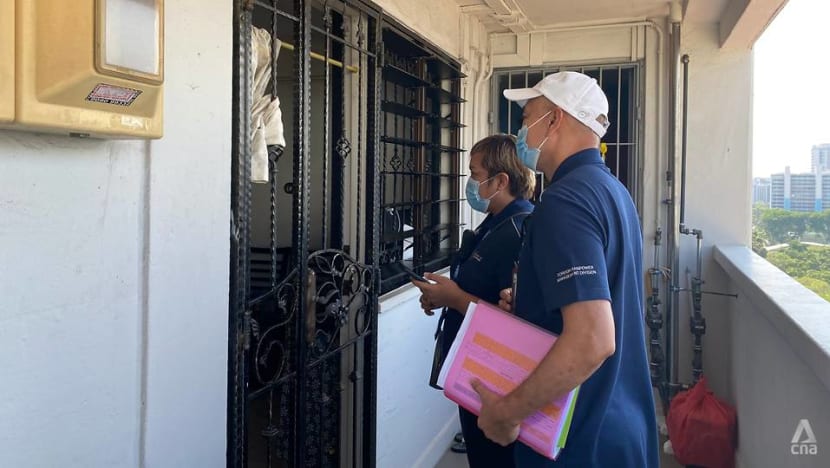Maids to get home visits from MOM officers to check on their living conditions

MOM officers visiting the home of a foreign domestic worker and her employer. (Photo: Ang Hwee Min)
SINGAPORE: Maids will receive visits from Ministry of Manpower (MOM) officers to check on their living conditions, with officers visiting 200 homes a month for a start, said the ministry on Monday (Apr 26).
The ministry began conducting visits to randomly selected homes on Apr 5, said MOM's director of engagement Tan Shu Xiang.
“During these home visits, our MOM officers will actually be checking on the working and living environments of the migrant domestic workers, so as to ensure that they are well settled in,” he added.
"We also remind the employers and the domestic workers about safe working conditions, as well as information about channels to seek assistance from if required.”
In addition to home visits, the ministry plans to expand in-person interviews to all first-time maids by the end of this year, said Mr Tan.
The Centre for Domestic Employees (CDE) aims to interview 2,000 maids a month. The centre has conducted in-person interviews with randomly selected first-time maids since 2017, typically three to six months after they start work, said MOM.
Due to the COVID-19 pandemic, the interviews have been conducted via video calls, and CDE plans to resume in-person interviews in May.
READ: Woman admits killing maid; starved her to 24kg and assaulted her almost daily in 'utterly inhumane' case
READ: Myanmar maid's death: MOM reviewing how doctors report potential abuse
The new measures will help the ministry to "respond promptly" to the workers' needs and allow it to address any issues and concerns they raise, said Mr Tan.
About 100 home visits have been conducted so far. No issues were found in the majority of these houses, Mr Tan said.
Responding to questions from reporters about how the interviews at the house visits are conducted and whether the employers are present, Mr Tan said the objective is to “provide a conducive environment” for maids to raise their concerns.
“During the house visit officers will make sure that the domestic workers have the privacy and the space needed to surface any issues to us,” he added.
The MOM officers do not stop employers from listening in on the interview, said Mr Li Junjie, senior assistant director of enforcement planning at the ministry.
“But what we want is for the employer not to interfere when we are engaging the migrant domestic worker,” he added.
“And if we see that the employer’s presence is affecting the domestic worker, we may then request for the employers to maybe step aside, if necessary we may ask the domestic worker to come out of the house for us to engage her.”
Employers are informed of the visits about a week prior, and there have been “no issues” from the majority of employers so far.
“Once we explain the intended purpose employers are gladly obliged for the visits to take place. For those that have any issues, then we will actually understand their concern, and see how best to work with them to overcome them,” said Mr Tan.
Employers who refuse the visit will be asked to bring in their maids to MOM for an interview, he said.
In one case, a maid told the MOM officer that her employers were scolding her in a harsh manner, but the employers also praised her when she did well, said Mr Tan.
“When we come across such concerns, we actually talk to employers, resolve the misunderstanding, and then things turn out well,” he added.
There were also instances where maids said they had insufficient rest. In these cases, MOM officers will work with employers to understand the maid's work schedule and help to make sure she is given enough time to rest, said Mr Li.
If the issue is serious enough, the case will be escalated for further investigation, he added. If signs of abuse are detected, the officers will call the police immediately.
Commentary: Myanmar domestic worker's death and the problem with the bystander effect
In February, a woman pleaded guilty to abusing her maid until she died in a case which the judge said was "utterly inhumane".
Ms Piang Ngaih Don, a 24-year-old maid from Myanmar, was punched, stamped on and starved until she weighed 24kg days before she died in 2016 from a brain injury.
Her employer Gaiyathiri Murugayan is facing 28 charges including culpable homicide. She is awaiting sentencing.












